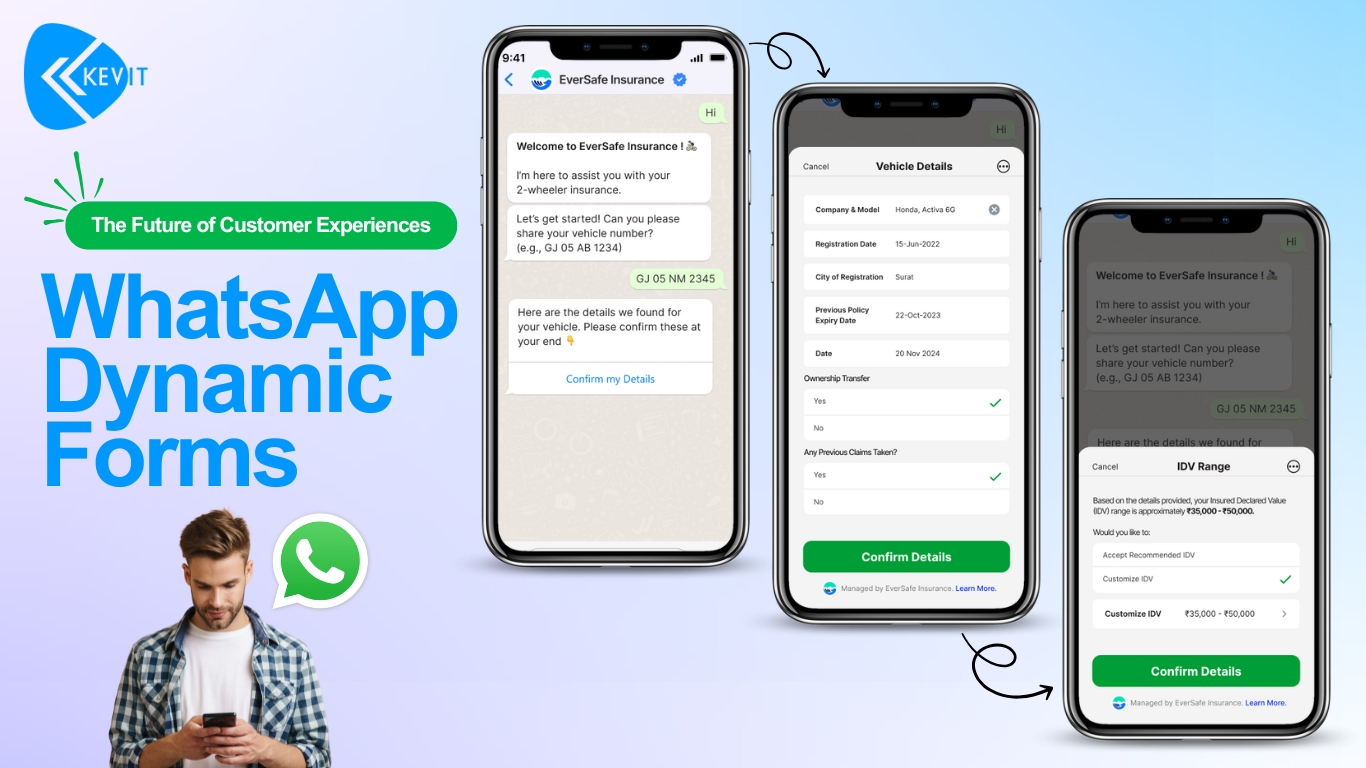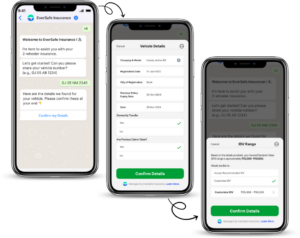WhatsApp Dynamic Forms: The Future of Customer Experiences

- December 11, 2024
- Priyanka Shah
- WhatsApp Forms, WhatsApp Post
WhatsApp Dynamic Forms: Unlocking the Potential
In an age where seamless customer experiences drive business success, WhatsApp has emerged as a game-changing communication platform. Among its innovative features, WhatsApp Dynamic Forms stand out as an essential tool for businesses to automate processes, collect data, and personalize interactions—all within the familiar WhatsApp environment. While static WhatsApp forms are maving a wave among businesses for various usecases like lead generation, appointment booking, feedback collection, this blog dives deep into what makes WhatsApp Dynamic Forms a must-have, the industries benefiting from them, and how Kevit.io is setting the benchmark for this development-extensive but transformative solution.
What Are WhatsApp Dynamic Forms?
WhatsApp Dynamic Forms are customizable, interactive workflows designed to collect and process information directly through WhatsApp. Unlike static forms, they adapt in real time to user inputs, offering a personalized and efficient experience. Users can fill in details, make selections, or provide information without the need to navigate away from WhatsApp.
Key Features:
- Real-Time Adaptability: The form structure evolves based on user responses, ensuring relevance at every step.
- Conversational Experience: Users feel engaged through an intuitive chat interface rather than overwhelmed by lengthy forms.
- End-to-End Process Completion: From input collection to confirmation, all steps are executed seamlessly within WhatsApp.
Examples: Buying insurance policies, filing loan applications, onboarding customers, booking appointments, and many more.
How Do WhatsApp Dynamic Forms Differ From Static Forms?
Feature | WhatsApp Static Forms | WhatsApp Dynamic Forms |
Definition | A fixed form that collects user information without any customization during the interaction. | A customizable, adaptive form that changes based on user inputs in real time. |
Interactivity | Low – users fill out a pre-set form with no change in structure. | High – form structure can adapt based on previous responses. |
Customization | Limited customization – form fields are fixed and cannot change during the interaction. | Highly customizable – fields and options can adapt dynamically based on user responses. |
User Experience | Straightforward; users complete a static form all at once, similar to traditional forms. | Personalized; users receive questions and fields that are relevant to them, reducing unnecessary inputs. |
Adaptability | None – The form is static and has a fixed layout regardless of the user. | High – Adapts in real time to user behavior or answers. |
Data Collection | Collects data all at once, regardless of context or relevance. | Collects relevant data based on dynamic conditions, improving accuracy. |
Best Use Cases | Basic information gathering, static lead forms, contact collection. | Complex scenarios requiring real-time decision-making, such as loan applications, insurance claims, and personalized recommendations. |
Technical Complexity | Low – Simple implementation without any real-time decision logic. | High – Requires advanced scripting for real-time dynamic adjustments. |
User Engagement | Low to Medium – Straightforward but can be less engaging without interaction. | High – Personalized interactions make the user feel more involved. |
Drop-off Rates | Medium to High – due to lack of engagement or flexibility. | Lower – as questions are tailored and relevant, leading to higher completion rates. |
Integration with Automation | Limited integration – mostly static data collection without automated branching. | Excellent integration with automation; supports dynamic conditions, APIs, and adaptive workflows. |
Scalability | High – Easy to scale for simple data collection but limited by fixed form design. | High – Highly scalable for complex use cases and varied customer segments. |
Flexibility | Low – Inflexible; the form structure remains static. | High – Can handle unexpected inputs and adjust on-the-fly based on conditions. |
Cost of Development | Low – Quick to deploy, low development effort. | High – Requires investment in scripting and testing for dynamic adjustments. |
Industries Leveraging WhatsApp Dynamic Forms
1. Banking
- Processes: Loan applications, customer onboarding, KYC verification, account management, and credit score updates.
- Why It Works: WhatsApp Dynamic Forms streamline complex banking processes, reducing the need for in-person visits and paperwork. They automate data entry, provide real-time updates on application status, and enable quick identity verification. This improves the speed of transactions, reduces errors, and ensures a smooth customer experience while adhering to regulatory compliance.
Use Cases:
- Loan applications: Dynamic forms gather detailed information step by step, validating the details in real time.
- KYC: Automatically collect and verify documents, reducing the manual effort and time spent on compliance checks.
- Customer onboarding: Simplified account creation with personalized forms based on user responses.
2. Insurance
- Processes: Policy issuance, claims filing, premium renewals and customer feedback collection.
- Why It Works: Dynamic forms in insurance not only automate the tedious data collection process but also provide personalized experiences for policyholders. Users can quickly fill out claims or renewal forms, upload documents directly within the form, all without switching platforms. This improves accuracy, reduces human error, and enhances customer satisfaction.
Use Cases:
- Policy issuance: Simplify policy creation with interactive forms that adjust according to user input.
- Claims filing: Collect detailed incident information, upload evidence, and automate the approval process.
- Premium renewal: Offer tailored renewal options based on user data and previous interactions.
3. Healthcare
- Processes: Appointment booking, patient intake forms, follow-up surveys and patient feedback collection.
- Why It Works: Healthcare institutions can leverage WhatsApp Dynamic Forms to improve operational efficiency by reducing paperwork and providing patients with a seamless, accessible experience. From booking an appointment to receiving reminders or providing feedback, these forms ensure real-time, accurate data collection. This simplifies administrative tasks and offers a better overall patient experience.
Use Cases:
- Appointment booking: Patients can easily select available time slots, provide symptoms, and confirm bookings.
- Patient intake forms: Gather medical history or consent forms before visits, reducing in-clinic wait times.
- Follow-up surveys: Collect feedback on patient care or the service received after consultations.
4. Automotive
- Processes: Test-drive bookings, service requests, lead generation for car sales, vehicle insurance renewals, and after-sales service surveys.
- Why It Works: The automotive industry can use WhatsApp Dynamic Forms to guide customers through test-drive scheduling, vehicle servicing, or post-purchase support. By providing a step-by-step journey, dealerships and service centers can increase customer engagement, boost lead generation, and personalize service offerings. These forms reduce the time spent on manual booking processes and provide customers with instant confirmation.
Use Cases:
- Test-drive bookings: Automate the booking of test drives by collecting relevant details (preferred car model, time slot, etc.) directly through WhatsApp.
- Vehicle service requests: Collect service history, vehicle details, and service preferences to streamline the process.
- Lead generation: Capture customer information from initial inquiries, qualify leads, and schedule appointments with sales teams.
Why Invest in WhatsApp Dynamic Forms Now?
Stay Ahead in Digital Transformation
Early adoption of dynamic forms positions businesses as leaders in digital innovation, catering to the growing demands of a modern, tech-savvy audience.
Increase Conversion Rates with Mobile-First Experiences
With mobile usage on the rise, a familiar messaging platform ensures high engagement and conversion rates without the need for additional app downloads.
Build Trust with Faster Processes
Transparency and efficiency in handling customer requests enhance trust, fostering stronger, long-term relationships.
Reduce Operational Costs
Automation cuts operational expenses, allowing businesses to allocate resources more effectively toward strategic growth initiatives.|
Capitalize on WhatsApp’s Familiarity
WhatsApp’s intuitive, user-friendly interface makes it easy for customers to complete tasks like filling forms or uploading documents. This familiarity reduces the learning curve and enhances user engagement, ensuring smoother and more successful interactions.
Which Businesses Should Integrate Dynamic WhatsApp Forms?
Embracing Digital Transformation
Organizations implementing digital-first strategies can use Dynamic WhatsApp Forms to simplify workflows, reduce manual effort, and create seamless, interactive customer experiences.
Prioritizing Customer Acquisition and Retention
For companies aiming to expand their customer base while keeping existing clients engaged, Dynamic WhatsApp Forms offer a tailored, hassle-free interaction that drives higher conversions and loyalty.
Enhancing Operational Efficiency
Businesses striving to optimize processes can benefit from the automation offered by these forms, reducing repetitive tasks, boosting productivity, and cutting operational costs.
Ensuring Compliance and Security
Industries with high regulatory demands can leverage Dynamic WhatsApp Forms to ensure secure, compliant data management while building customer confidence through robust safeguards.
Delivering Impactful ROI
Organizations seeking measurable returns on their technology investments can rely on Dynamic WhatsApp Forms to enhance customer satisfaction, streamline operations, and directly contribute to revenue growth.
Take the First Step Towards Transformation
Whether you’re looking to streamline customer onboarding, simplify loan applications, or improve lead generation, WhatsApp Dynamic Forms are your answer. Contact Kevit.io today to discover how we can tailor this revolutionary solution to your business needs.
Let’s make customer interactions smarter, faster, and more engaging—together!
See Kevit.io In Action
Automating business processes with Kevit.io is now just a click away!
